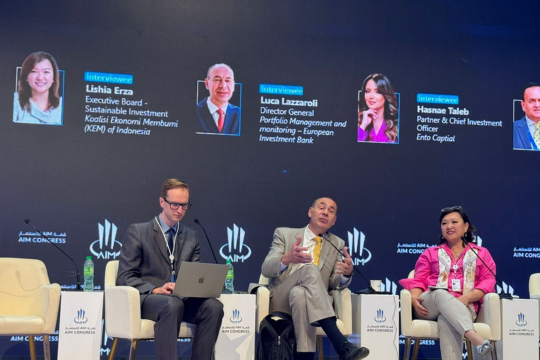Unlocking South Sumatra's Coconut Potential Through Value Chain Collaboration Workshop
Palembang, 10 July 2024 - South Sumatra harbors significant potential for coconut plantations, capable of producing various sustainable products. In 2022, the region produced approximately 58,000 tonnes. Products range from fresh coconut water to coconut oil, and from balm ingredients to mediums for carbon capture. These opportunities emerge through dialogues with innovative entrepreneurs exploring derivative products from coconuts. Koalisi Ekonomi Membumi together with Kulaku Indonesia and UNDP facilitated the Coconut Value Chain Workshop on July 9-10, 2024, in Palembang and Banyuasin. The two-day workshop highlighted "How Collaboration Creates Impactful Business", building a collaborative ecosystem to boost innovation and growth of the coconut value chain.
Under the Value Chain Collaboration Canvas and Sustainable Investment Guidelines framework, the workshop aimed to enhance the mobilization of impact investing and mainstream impact measurement and management, thereby strengthening the sustainable enterprise's ecosystem. The workshop, benefiting from expert insights, introduced sustainable investment concepts, the importance of impact articulation, and collaboration with value chain stakeholders. Over 60 participants, including entrepreneurs, ecosystem enablers, and local government representatives, attended the workshop.
Lishia, Executive Board of KEM, highlighted, "In Indonesia, 95% of coconut plantations are smallholder-owned, with 4 million coconut farmers relying on them for their livelihood. Therefore, KEM has made coconut one of the prioritized commodities to be promoted." KEM and Supernova have been developing the Value Chain Collaboration Canvas (VC3) approach to facilitate and nurture collaborative partnerships among the stakeholders in the high-value commodities supply chain, including coconut, coffee, cacao, and other non-timber forest products cultivated by implementing sustainable practices.
Throughout the two-day workshop, followed by a sensing trip to the coconut farm and processing facility, participants identified gaps and needs, as well as potential collaborations with other value chain players to create bigger impacts. One highlighted best practice was from Kulaku, a social enterprise in Banyuasin, South Sumatra. Beyond business, Kulaku is committed to long-term sustainability by investing in community futures through the Beasiswa Tani Muda (BTM) scholarship program. This initiative provides educational opportunities for farmers' children, promoting individual growth and ensuring sustainable practices across generations.
Kulaku's example demonstrated how a clear theory of change and consistent impact monitoring could guide business direction. Kulaku has partnered with stakeholders, including KEM, Supernova, Dompet Dhuafa, Bank Indonesia, Sriwijaya University, and MSMEs offices from South Sumatra. This holistic partnership exemplifies how impact-oriented businesses can positively transform ecosystems. By collaborating with key stakeholders, these businesses not only focus on profit but also strengthen the coconut plantation ecosystem, leading to productive economic activities for local communities.
Despite the workshop's short duration, it inspired participants and the organizing committee with its collaborative spirit, translating grand ideas into actionable approaches. By focusing on strengthening the sustainable enterprise ecosystem, the workshop showcased how sustainable business impacts being implemented at the grassroots level are able to create decent work and economic growth. Thus, it is crucial to continue translating grand policy plans into small, meaningful actions.
About Koalisi Ekonomi Membumi
Koalisi Ekonomi Membumi (KEM) is a collective movement that aims to accelerate the growth of a sustainable investment ecosystem that prioritizes Indonesia's local wisdom through cross-sector and cross-stakeholder collaboration. KEM currently has over 30 member organizations. KEM has a vision that Indonesia's high value-added supply chains are run by sustainable businesses that contribute to the protection and preservation of nature and the improvement of welfare in areas committed to sustainability. In line with this vision, KEM aims to unlock USD 200 million in sustainable investment and funding opportunities that can be channeled to 100+ sustainable businesses connected to 100 jurisdictions committed to sustainable development.
Contact person
Bryan Citrasena - Membumi Economy Coalition Secretariat
bryan@ekonomimembumi.co

